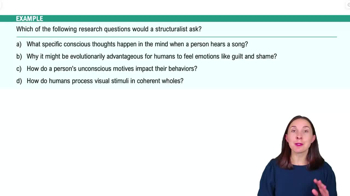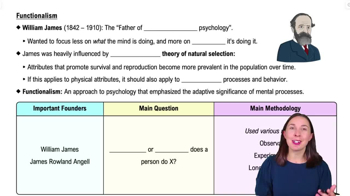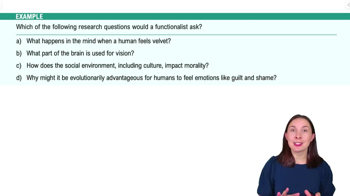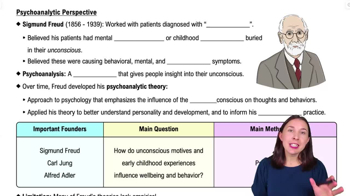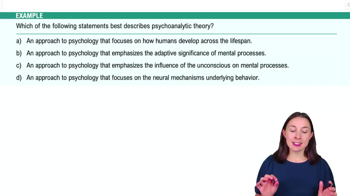Table of contents
- 1. Introduction to Psychology1h 43m
- 2. Psychology Research2h 20m
- 3. Biological Psychology2h 41m
- 4. Sensation and Perception28m
- 5. Consciousness and Sleep32m
- 6. Learning41m
- 7. Memory34m
- 8. Cognition37m
- 9. Emotion and Motivation35m
- 10. Developmental Psychology33m
- 11. Personality48m
- 12. Social Psychology41m
- 13. Stress and Health41m
- 14. Psychological Disorders44m
- 15. Treatment47m
1. Introduction to Psychology
Early Schools of Thought
Struggling with Psychology?
Join thousands of students who trust us to help them ace their exams!Watch the first videoMultiple Choice
Dr. Garfield believes that while poverty can be detrimental to society, it does provide employment for many in fields such as social work, medicine, psychology, politics, and nonprofit organizations. Dr. Garfield's belief relates best to which early field of psychology?
A
Structuralism
B
Functionalism
C
Gestalt
D
Psychoanalysis
 Verified step by step guidance
Verified step by step guidance1
Begin by understanding the key concepts of each early field of psychology mentioned: Structuralism, Functionalism, Gestalt, and Psychoanalysis.
Structuralism focuses on breaking down mental processes into the most basic components. It is more concerned with the structure of the mind rather than its function.
Functionalism, on the other hand, is concerned with the purpose of consciousness and behavior. It emphasizes how mental activities help an organism adapt to its environment.
Gestalt psychology emphasizes understanding the whole experience rather than breaking it down into parts. It focuses on perception and problem-solving.
Psychoanalysis, developed by Freud, focuses on the unconscious mind and the influence of childhood experiences on behavior. It is more concerned with internal psychological processes.

 5:44m
5:44mWatch next
Master Structuralism with a bite sized video explanation from Hannah Gordils
Start learningRelated Videos
Related Practice



